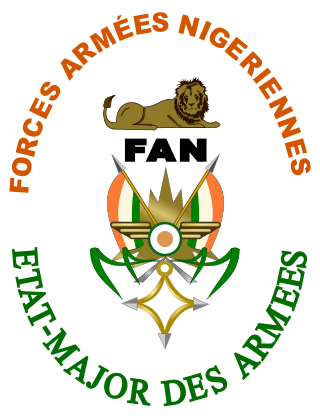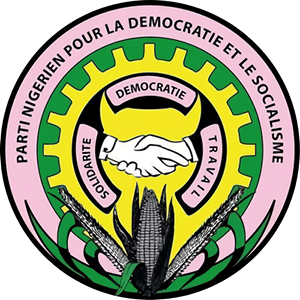Related Research Articles

The Niger Armed Forces (FAN) includes military armed force service branches, paramilitary services branches and the National Police. The Niger Army, Niger Air Force and the National Gendarmerie of Niger are under the Ministry of Defense whereas the National Guard of Niger and the National Police fall under the command of the Ministry of Interior. With the exception of the National Police, all military and paramilitary forces are trained in military fashion. The President of Niger is the supreme commander of the entire armed forces.

The National Movement for the Development of Society is a political party in Niger. Founded under the military government of the 1974–1990 period, it was the ruling party of Niger from 1989 to 1993 and again from 1999 until 2010, when a coup on 18 February 2010, by a military junta called the Supreme Council for the Restoration of Democracy (CSRD) ousted the president, Mamadou Tandja.

The Union for Democracy and the Republic is a political party in Niger. Its founding leaders were former Prime Minister Amadou Cissé and Amadou Madougou.

The Nigerien Party for Democracy and Socialism is a political party in Niger. It is a broadly left-leaning party, part of the Socialist International, and since 2011 it has been in power following the election of its long-time leader, Mahamadou Issoufou, as president. Mohamed Bazoum is President of the PNDS, and its Secretary-General is Foumakoye Gado.

Ibrahim Assane Mayaki is a Nigerien politician, who served as the Prime Minister of Niger from November 27, 1997, to January 3, 2000.

Mohamed Bazoum, is a Nigerien politician who is the current president of the Republic of Niger. He has been in office since 2 April 2021.
André Salifou is a Nigerien politician, diplomat, and professor. He was president of the High Council of the Republic during the 1991–93 transitional period, briefly served as Minister of Foreign Affairs in 1996, and was an unsuccessful presidential candidate in 1999.

The Tuareg Rebellion of 2007–2009 was an insurgency that began in February 2007 amongst elements of the Tuareg people living in the Sahara desert regions of northern Mali and Niger. It is one of a series of insurgencies by formerly nomadic Tuareg populations, which had last appeared in the mid-1990s, and date back at least to 1916. Populations dispersed to Algeria and Libya, as well as to the south of Niger and Mali in the 1990s returned only in the late 1990s. Former fighters were to be integrated into national militaries, but the process has been slow and caused increased resentment. Malian Tuaregs had conducted some raids in 2005–2006, which ended in a renewed peace agreement. Fighting in both nations was carried on largely in parallel, but not in concert. While fighting was mostly confined to guerrilla attacks and army counterattacks, large portions of the desert north of each nation were no-go zones for the military and civilians fled to regional capitals like Kidal, Mali and Agadez, Niger. Fighting was largely contained within Mali's Kidal Region and Niger's Agadez Region. Algeria helped negotiate an August 2008 Malian peace deal, which was broken by a rebel faction in December, crushed by the Malian military and wholescale defections of rebels to the government. Niger saw heavy fighting and disruption of uranium production in the mountainous north, before a Libyan backed peace deal, aided by a factional split among the rebels, brought a negotiated ceasefire and amnesty in May 2009.
Sanoussi Tambari Jackou was a Nigerien politician and the President of the Nigerien Party for Self-Management (PNA-Al'ouma). He was Vice-President of the National Assembly of Niger from 1993 to 1994 and served in the government as Minister of State for Higher Education, Research, Technology, and African Integration later in the 1990s. He was a Deputy in the National Assembly from 2004 to 2010.
The Cinema of Niger began in the 1940s with the ethnographical documentary of French director Jean Rouch, before growing to become one of the most active national film cultures in Francophone Africa in the 1960s-70s with the work of filmmakers such as Oumarou Ganda, Moustapha Alassane and Gatta Abdourahamne. The industry has slowed somewhat since the 1980s, though films continue to be made in the country, with notable directors of recent decades including Mahamane Bakabe, Inoussa Ousseini, Mariama Hima, Moustapha Diop and Rahmatou Keïta. Unlike neighbouring Nigeria, with its thriving Hausa and English-language film industries, most Nigerien films are made in French with Francophone countries as their major market, whilst action and light entertainment films from Nigeria or dubbed western films fill most Nigerien theatres.
Republic Day, a national holiday in the Republic of Niger is commemorated on 18 December 1958.

Harikanassou is a large village and rural commune in the Boboye Department of the Dosso Region of southwest Niger, 90.7 kilometres (56.4 mi) by road southeast of the capital of Niamey. At the time of the 2012 census, the rural community had 23,567 residents living in 3,340 households. Onion cultivation is a chief source of income for many, along with the cultivation of lettuce, beans, squashes, and tomatoes.
Issa Lamine is a Nigerien politician. He led the Toubou-based Front Democratique Revolutionnaire, one of several rebel groups operating in the far north and east of Niger in the late 1990s. Lamine entered government as a representative of the eastern town of N'Gourti in 2000. As a member of the Democratic and Social Convention (CDS-Rahama), he was a Deputy in the National Assembly of Niger and then served in the government of Niger as Minister of Public Health from 2007 to 2009. He left the CDS-Rahama in 2009 and was elected to the National Assembly as an independent candidate.
The 1999 Nigerien coup d'état occurred on 9 April 1999 and resulted in the death of President Ibrahim Baré Maïnassara and the installation of Daouda Malam Wanké as President on 11 April. Maïnassara was shot under unclear circumstances in an ambush at either Diori Hamani International Airport, potentially while attempting to flee the country, or at a military base, likely by members of the Presidential Guard.
Doula Gabde Harouna, better known as Harouna Doula is a Nigerien football manager and former player. He was Manager of the Niger national football team from 2009 to 2012, leading Niger to its first African Nations Cup qualification in 2012, their first African Nations Championship qualification in 2011, and the winning of the UEMOA Tournament in 2010. He was demoted following the first match loss at the 2012 Nations Cup finals.

La Robe du temps is a 2008 film from Niger directed by Malam Saguirou, whose documentaries have won a number of international awards.
For the Best and for the Onion is a 2008 Nigerien documentary film about onion farmers in Galmi, Niger, written and directed by Sani Elhadj Magori.
Mariama Hima Yankori is a Nigerien film director, ethnologist and politician. She became the first female Nigerien film director in the 1980s, was State Secretary of Promotion of Women and Protection of Children, and later the first female Nigerien ambassador to France.
Moussa Hamadou Djingarey is a Nigerien film director.
References
- ↑ "Malam Saguirou, joven cineasta de Níger, presenta su último documental en el Círculo de Bellas Artes de Madrid" (in Spanish). Casa África. 2010-09-21. Retrieved 2012-03-09.
- 1 2 3 "Malam SAGUIROU". Africultures (in French). Retrieved 2012-03-09.
- ↑ "Malam Ibrahim Malam Mahaman Mahaman Saguirou". Berlinale Talent Campus. Archived from the original on 2012-04-20. Retrieved 2012-03-09.
- 1 2 "Malam Saguirou" (in French). centre culturel franco nigerien. Retrieved 2012-03-09.
- 1 2 Mamounia Zakaria. "LA DIFFUSION ET LA CIRCULATION DES FILMS NIGÉRIENS" (in French). Université Abdou Moumouni, Niamey. Retrieved 2012-03-09.
- ↑ "Pour le meilleur et pour l'oignon ! (2008)". uniFrance Films (in French). Retrieved 2012-03-09.